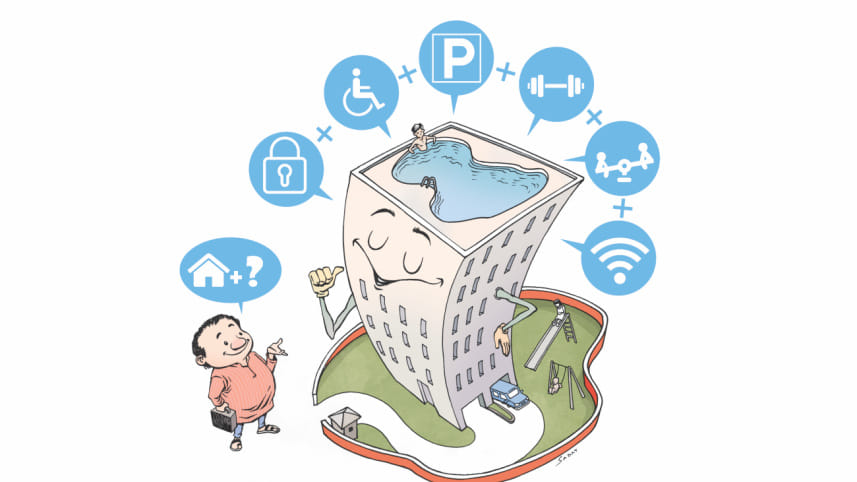Real estate sector on a steady growth path

Bangladesh's real estate sector is growing steadily on the back of rapid development of the country, rising demand for housing, expanding middle class and soaring per-capita income.
“The sector is quite stable,” said Alamgir Shamsul Alamin (Kajal), president of the Real Estate & Housing Association of Bangladesh.
Saif Khondoker, director of Shanta Holdings Ltd, said the demand in the real estate sector will grow steadily as the economy is growing at a healthy pace and per-capita income is increasing significantly.
Dr Saamiya Seraj, director of Sheltech (Pvt) Ltd, said the real estate market is bouncing back from a period of stagnation.
“From our end at Sheltech, we've seen a renewed interest from clients in buying apartments, as well as commercial spaces. The real estate sector is on the rise.”
Md Mahmudul Kabir, executive director for sales and marketing at Building Technology & Ideas Ltd (bti), said the growth is steady.
“As the economy is growing and the middle class is expanding, the demand for housing will go up. However, it is not the time for quick growth. Rather this is a time for steady growth.”
The optimism is shared at a time when the country is approaching the 11th parliamentary elections. As in the past, such elections were, on some occasions, marked by violence, denting the economy in general and the real estate sector in particular.
Alamin said the parliamentary elections are knocking at the door, so people are reluctant to invest at this moment.
“Sales always slow down before the parliamentary elections and this time is no different. People are waiting to make a decision until after the elections.”
Saamiya Seraj said in 2017, interest rates from home loans had dropped to single-digit figures, which had caused a surge in apartment purchase by middle-income families. Unfortunately, at the start of 2018, interest rates increased, which could have caused a slight dip in apartment sales earlier in the year.
"However, even with the higher interest rates, we have had many clients looking for apartments and buying their dream homes in various locations."
The exact number of apartments sold in a particular year is hard to come by as not all properties are registered. Alamin said he thinks the sector is delivering some 6,000 to 8,000 apartments a year.
SAK Ekramuzzaman, managing director of Rakeen Development Company (BD) Ltd, said the cost of land is a challenge for making apartments affordable.
"If developers own the land of a project they can bring down the price of an apartment. If they share the land with someone else, then prices go up."
Between 1972 and 2010, land prices in Dhaka city grew by an average of 100-125 percent per year, according to Sadiq Ahmed, vice-chairman of the Policy Research Institute of Bangladesh.
To make housing more affordable, Saif Khondoker suggests the government to take initiatives to encourage decentralisation. “We should build suburbs on the outskirts of Dhaka city to relieve stress from the core areas.”
He said if well planned suburbs with proper zoning can be developed in the upcoming areas such as Purbachal and Jheelmil by providing a large swathe of land to reputed developers at a reasonable cost, it would help improve the situation. Developing small parcels of land in an unplanned manner will just result in the same problem.
Khondoker said along with the rising price of land, construction costs are going up for developers. Prices of cement and steel rebar have increased steadily over the last few years. The local currency, taka, has devalued against the US dollar which has also increased the cost of imported items.
"The ceiling for home loans should be raised from the existing Tk 1.20 crore, and the interest rates should be brought down further to encourage people to invest in property.”
Khondoker said in Bangladesh the registration cost is very high when someone buys a property. The cost is around 16 percent of the property price.
"If the government takes the initiative to reduce it, it will help to make housing more affordable."
Shakill Siddique, chairman of Comprehensive Holdings Ltd, said if different government agencies work as a "one-stop service," it would make the entire process smooth for the real estate business.
He said to begin a project a developer has to get the clearance from banks. Then it has to go to RAJUK for plan approval, obtain electricity and water connections and permissions from other government agencies. If these services were made available under a one-stop service, it would take the sector another step further, he added.
The real estate sector could achieve double-digit growth provided the industry gets policy support from both financial and infrastructure sectors, claimed Mashid Rahman, divisional director, real estate division, RANCON Holdings Limited.



 For all latest news, follow The Daily Star's Google News channel.
For all latest news, follow The Daily Star's Google News channel.
Comments